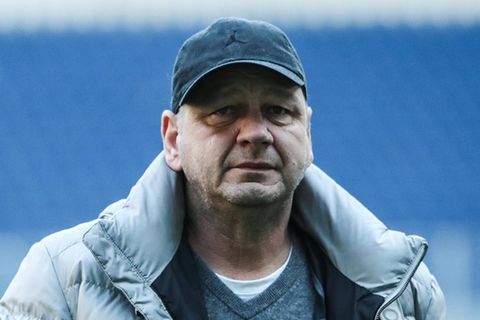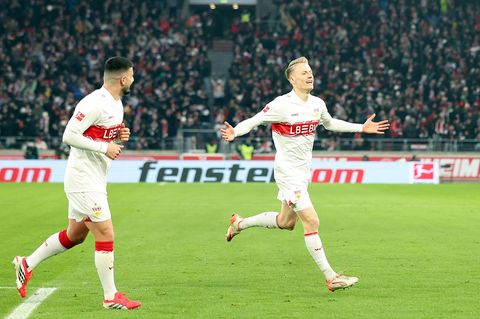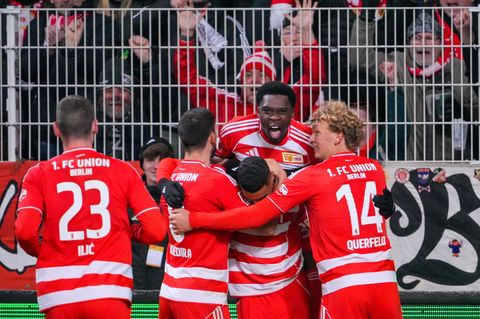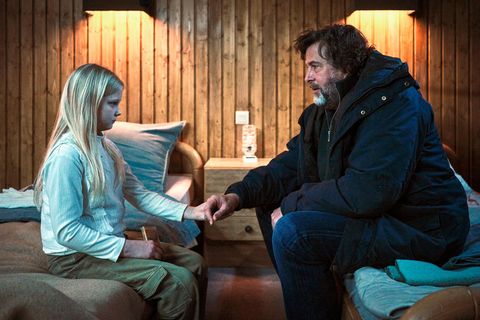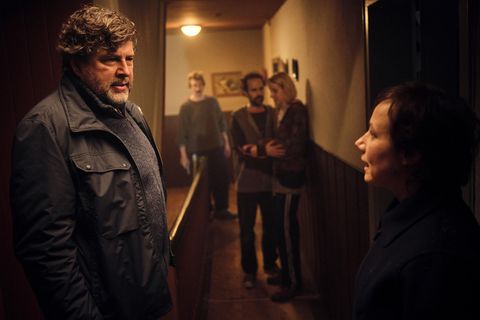Kicking as hard as he can, Maik sends the ball flying toward the goal, but Mario intercepts it - with his forehead - bouncing the ball six feet into the air before it drops to the floor. When it lands, Mario shifts his stance and kicks the ball, scoring a goal from 23 yards away. The game is 8-8, and now it's getting interesting. »Do you have a headache already?« Maik asks. »No, today I'm fine,« Mario responds.
The two teenagers play what they call »Bolzspiel« almost every afternoon. They stand at opposite sides of the basketball-court-sized gymnasium and shoot the ball back and forth, with the defender only allowed to block with his body and head. The player on the offensive doesn't go past the center line, in an attempt to keep headaches to a minimum. »My fastest shot was 67 miles per hour,« says Mario, before going on to win this afternoon's contest 12-10.
Fortunately, if they do get headaches, they don't have to go far to find a place to lie down. The gym where Maik and Mario play is part of their home, all contained in the building of the Freiburger soccer boarding school. Since the school opened its doors in November 2001, 13 young men be-tween the ages of 15 and 18 have moved here, hoping the school will be the first step toward a career as a professional soccer player. »I don't want to have a job where I sit in an office for eight hours a day,« says Maik Schutzbach, who, at 15, is the youngest student at the school. »I want to play soccer in front of fans in a stadium.«
He's already partly there: The soccer school is situated in the main block of the Möslestadion in Freiburg. SC Freiburg, the national league club in that city, has invested $4.4 million into the school facility, including weight-lifting rooms, classrooms and dormitories. Operating the boarding school costs another $440,000 a year, providing the students with free food, training and housing. »The young people here have better conditions than our professionals,« said Andreas Bornemann, 30, principal of the boarding school.
At 1 p.m., Bornemann sits in the school cafeteria and eats his lunch. Behind him, the menu offers »Potatoes with «Welcome to Hell Sauce',» a common meal, since the students need the energy provided by carbohydrates. As the soccer-stars-in-training enter the hall they crowd around Bornemann and slap hands with him, showing their respect for the older man: For many years, he was one of the best players on SC Freiburg's amateur team, as well as playing on the professional team against opponents like Schalke 04 and Bayer Leverkusen - the type of matches the students here dream about. «Naturally, they all ask me about it: »What's it like playing against Bayer??« Bornemann says. »It's all fast moves and quick kicks,« he usually replies. »There's no fussing around.«
Bornemann knows how long the way to the top can be, since he began playing with Freiburg when he was 17. »In this boarding school we provide opportunities to grow,« he says. »But I also tell the boys that they haven't made it just because they're here.« The young soccer players today don't give themselves enough time, he explains; by the time they're 20, they want to be playing in the National League - and that's too early, according to Bornemann. »Players like Deisler and Kehl, who made it that early, are an exception,« he says. »You can still become a professional at the age of 24.«
The boarding school attracts players from around Germany, some coming from the Lake Constance area, others from Swabia, and even one from Switzerland. One player, Boubacar Coulibaly, comes from the African country Mali, traveling to the school with his older brother, one of the stars of the Freiburg team. Because of SC Freiburg's good reputation, many students try to get into the school, which doesn't have a formal application process. Instead, applicants are observed by the club's coaches and then get invited for a training session. If the player impresses the coaches and seems like he can cope with a life away from home, the school gains another student.
Being a good enough soccer player to get accepted doesn't mean life at the boarding school is easy, though. The students wake up every day at 6:35 a.m. and hit the community showers before eating breakfast at 7 o'clock and heading off to school. On Tuesdays and Thursdays, the students have soccer training in place of their first two classes, in addition to regular afternoon training sessions and weight-room workouts twice a week. There's little spare time - maybe enough for an occasional trip to the movies, but only if an away game doesn't take them out of town for the night.
At the morning training session, 42-year-old Conny Wehmeier, the school's resident director, mingles with the boys. Wehmeier got his job after watching Volker Finke, coach of SC Freiburg, on television, where Finke said that he was looking for a »soccer-crazy teacher« for the school. Weh-meier, who used to work with drug addicts in Hannover, applied for the job and now lives with the young players, serving, Bornemann says, as a »back-up father.« Wehmeier resists this description. »No one can replace parents,« he says. »I can only try to make it a little nicer here.«
His job is a very hands-on position, with Wehmeier, who lives in the same building as the students, helping the players with their personal lives as well as their soccer skills. Living, studying and training together melds the boarding school soccer players into a tight-knit group. Once a week, Wehmeier gets the students together to hash out problems, dealing with issues like loud music being played when some students want to sleep - a problem that briefly took care of itself when a short-circuit cut off all power to the building.
Wehmeier also oversees the students' classes and organizes cramming lessons to help the kids deal with difficult subjects. The »cramming teacher« also helps teach German to the professional players on SC Freiburg who come from places like Georgia, Mali and Tunesia.
As much as the students love soccer, their studies are just as important. Maik, for example, has signed up for extra lessons in English, even though his grades are rather good. Although he's a member of the Under-16 Youth National Team, he hasn't lost sight of the importance of education and plans on earning his high school diploma, despite of his dreams of going pro.
Like many of the students, Maik struggles with homesickness. »Some-times you can't get your own couch out of your head,« he says. Almost every weekend, he drives 65 miles to the Swabian city of Mühlheim to see his girlfriend, Carolin. »Absence makes the heart grow fonder,« he says, comforting himself when he can't see her. He also tries to banish homesickness by doing well on the playing field, winning the first 15 games of the season with his team. That doesn't always work, though. In one game, the only point he scored was in his own goal, after he sent the ball flying in the wrong direction. »I really whacked it in there,« he says, laughing. Nevertheless, the team won 6-1.
The students also ward of homesickness by keeping in mind the importance of their training. »You must realize that you chose to come here,« explained Freddy Kedak, 17, who came to Freiburg from the Lake Constance area. »I am here because I have the best conditions to become a professional,« he says. Freddy says he hasn?t thought much about what happens if his dreams of a professional soccer career don't come true. »I'll do something with sports,« he says.
The 13 students at the SC Freiburg boarding school train alongside 160 other teens, all of whom hope to be able to make a living playing soccer. Since the odds are against many of them, one of Wehmeier's responsibilities is to talk with the kids about what happens if their dreams don't come true. Two of the school's students graduate at the end of the year, for example, but only one will be picked up by the club's amateur team; the other one was »stagnating,« the coaches said, so they're not taking him on.
»That's hard for him,« Wehmeier says. Nevertheless, the students continue to support the cut player, with two students announcing they would »play for him« - try to make him look good on the field - when they heard the announcement.
Even with such supportive team-mates, though, the students know they have to do their best if they expect to keep on moving up in the ranks. »The pressure is always there,« Mario says. »It's constant,« Maik adds, but the students are used to it. »The good thing is, if you're in a hole, the coaches get you out,« says Mario. When his playing on the soccer ground started slipping, there were no official reproaches - the trainers simply sent him home for a short holiday.
That pressure also keeps the students practicing, which is why Maik and Mario head to the gym again after lunch, intent on another heated round of their favorite game. They're shocked to be stopped by a custodian, who tells them they're not allowed to play in the gym anymore because their shoes are marking up the floor.
»That can't be,« Maik protests, and the two teens show the man the light rubber soles of their shoes. The custodian relents - and it's a good thing for the friends, because life just wouldn't be the same without a regular game of Bolzspiel.
